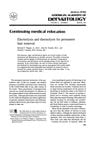TLDR Individualized treatment plans are crucial for managing excessive hair growth.
The document "Therapy of hypertrichosis" discussed various treatment options for hypertrichosis, a condition characterized by excessive hair growth. The authors, Christian Kunte, Hans Wolff, Christina Gottschaller, and Ulrich Hohenleutner, reviewed different therapeutic approaches, including pharmacological treatments and physical methods like laser therapy. They emphasized the importance of individualized treatment plans based on the underlying cause of hypertrichosis and patient-specific factors. The paper highlighted the effectiveness of certain treatments while also noting potential side effects and the need for further research to optimize therapy strategies.
39 citations
,
July 2005 in “Current medical research and opinion” Topical cream eflornithine 11.5% can slow hair growth and may help reduce hair removal frequency.
6 citations
,
November 2001 in “Der Hautarzt” Photothermolysis is the best method for permanent hair removal.
 150 citations
,
April 1999 in “Dermatologic Clinics”
150 citations
,
April 1999 in “Dermatologic Clinics” Laser hair removal effectiveness depends on targeting hair structures without harming the skin, and improvements require more research and expert collaboration.
20 citations
,
July 1998 in “Archives of dermatology”  58 citations
,
March 1985 in “Journal of The American Academy of Dermatology”
58 citations
,
March 1985 in “Journal of The American Academy of Dermatology” The document concludes that electrolysis and thermolysis can permanently remove hair but calls for better regulation to ensure safety, and notes a possibility of hair regrowth and rare complications.
 26 citations
,
March 2014 in “Arquivos Brasileiros De Endocrinologia E Metabologia”
26 citations
,
March 2014 in “Arquivos Brasileiros De Endocrinologia E Metabologia” The document concludes that proper diagnosis and combined treatments are key for hirsutism management, and weight loss may help overweight patients.
 3 citations
,
July 2011 in “Expert Review of Dermatology”
3 citations
,
July 2011 in “Expert Review of Dermatology” Effective treatments for excessive hair growth in women include creams, laser therapy, and medications, with the choice depending on individual needs and potential side effects.
502 citations
,
February 2008 in “The Journal of Clinical Endocrinology & Metabolism” Treat significant hirsutism with medication and hair removal; use birth control pills first, adding antiandrogens if needed.
 32 citations
,
January 2010 in “Dermatology”
32 citations
,
January 2010 in “Dermatology” Combining laser hair removal with topical eflornithine is recommended for better results in treating unwanted facial hair.
 19 citations
,
January 2007 in “Dermatology”
19 citations
,
January 2007 in “Dermatology” Unwanted facial hair significantly impacts over 40% of women's psychological and social well-being, and various treatment options are available.





